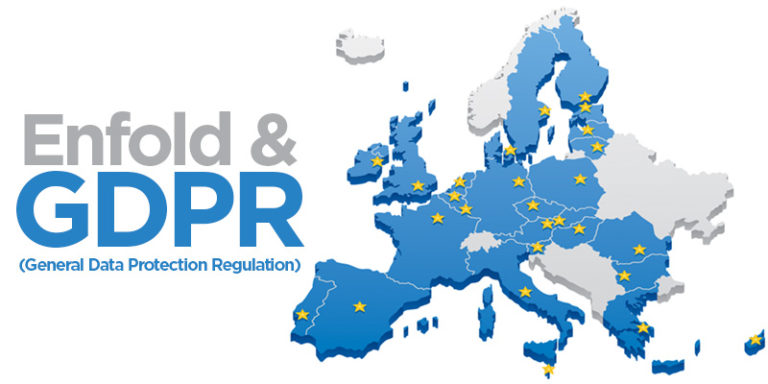Enfold 4.4 and the GDPR
(General Data Protection Regulation)
First things first: especially if you are European this law was very present during the last weeks and there is a good chance you already know about it. If you don’t: what exactly is the General Data Protection Regulation?
What is the GDPR?
“The General Data Protection Regulation (GDPR) is a regulation by which the EU intends to strengthen and unify data protection for all individuals from the European Union (EU). It also addresses the export of personal data outside the EU.
It aims primarily to give control back to EU citizens and residents over their personal data and to simplify the regulatory environment for international business (any company that is gathering, processing or storing the personal data of EU citizens).”
If you ended up on our site chances are good you are running your own website. If you have visitors from the EU on your site the GDPR basically requires you to adhere to European standards regarding the data of your users, otherwise you might get fined.
What do I need to do?
At the very least you need to set up a proper privacy policy on your website (WordPress 4.9.6 added the tools to do that), establish a record of processing activities and make sure that users get control over their data (they should be able to get info on what data you have about them, how you use it and if requested you also need to remove it, if that does not interfere with other lawful duties of yours) We are not going into detail here since there are a ton of fully fledged, well written articles out there that explain in detail which steps to take to be compliant.
What do I not need to do?
There are currently a lot of horror stories out there on how websites must be adapted (like all forms must come with checkboxes, all user IP addresses must be erased, all external services like Google Fonts, Video Embeds and Maps must be removed, all Cookies must be blocked and whatnot).
Non compliance will result in catastrophic fines and will end your business. We should all close our websites right now and be done with it. etc etc
We have talked to lawyers, we have visited information events and we have scoured the web for reliable resources written by people with a background in data protection or law. The gist we got from those sources:
It’s all not as bad as it sounds. Yes there is some work to do. But many of these “required changes” are highly debatable or outright wrong, and even if you don’t get everything right from the beginning: the authorities in each country are tasked to try to inform first and only if they encounter repeated violation of the law impose fines.
The key takeaway from our talks with lawyers
This might probably be the most important takeaway we got from our research. According to our lawyers you can pretty much use every feature as is if one of 2 conditions are met: legitimate interest on your side, or consent given by the visitor.
The problem with legitimate interest is that its one of those things that are not strictly defined by the law, which means its open to interpretation. The question is: when are you allowed to put your interest first and when do you need to step back and ask for permission? A question that got no general answer as we understand it, but needs to be reviewed for each case individually.
Although legitimate interest may be open to interpretation, according to our lawyers it’s usually still the better option compared to user consent. The problem with consent is that it can be revoked at any time which can cause you a lot of extra work.
So if its possible its better to argue that you need a feature for a particular business reason, inform the user on your privacy policy page about it and be done with it, instead of placing consent checkboxes and popups all over the website ;) In some cases this might not be possible, so we have added several new options to the theme that allow you to go either route, depending on what you (and your lawyers) feel is appropriate.
So what did change with Enfold 4.4
Finally we are talking about the theme :D As was discussed above, it is currently hard to tell what is allowed, what is not and what is in a legal grey area. So what we did is: allow you to choose how you want to use certain features, depending on what the legal advisors and authorities in your country tell you :)
External services
The biggest changes we applied are in regard to external services. Since external services receive user IP addresses if you use their services we have implemented ways that this only happens on user interaction.
You can now set up your instagram and facbook widget in a way that they do not send data unless the user interacts with them. Same goes for google maps where you can set up a placeholder image that is displayed until the user requests the actual map. The very same was implemented for vimeo videos and youtube. The cool thing about those features is that its not only helpful with data protection but its also in accordance with our recent efforts to improve page speed and performance scores. And it of course helps a lot with performance if external sources are only loaded on user request.
We have also implemented a font upload feature that allows you to upload google webfonts (or any fonts for that matter) to your webserver. Users have asked for the possibility to use their own custom fonts for some time now and it was a good opportunity to implement that feature ;)
Consent Checkboxes
Enfold now allows you to display checkboxes after any theme generated form, that asks for user acceptance of your privacy policy before sending the form. As mentioned earlier we do not think that this is necessary (legitimate interest vs consent), but it was requested so often, we figured we can at least provide the feature for now until there are definite rulings for sending contact, newsletter or comment forms :)
One more word about Cookies
You may notice the absence of a feature to generally disable cookies. This is a “requirement” that is also heavily discussed on the internet but since Enfold does not set any cookie that stores any personal information we decided against it. Enfold cookies do one of 3 things:
- dismiss the cookie consent bar permanently (permanent cookie)
- make sure that the breadcrumb navigation is displayed properly (session cookie)
- allow a user to disable certain features like webfonts, analytics, maps or videos (permanent cookies)
As you can see none of those store any user information, so the GDPR does not apply here. We would recommend to mention that you set cookies in your privacy policy and also explain how they are used and how to disable them in the web browser, if the user really really does not want any cookies to be set, but we do not think its necessary to block them as a whole. If you think it is: there are plugins out there that can do the job.
Last but not least: a disclaimer :
We are not lawyers, so don’t take any of this as legal advice!
We wrote down what we have been told by people who are well versed in legal matters but a lot of this is subject to interpretation so make sure to consult with your lawyer if you want to be sure what to do.














